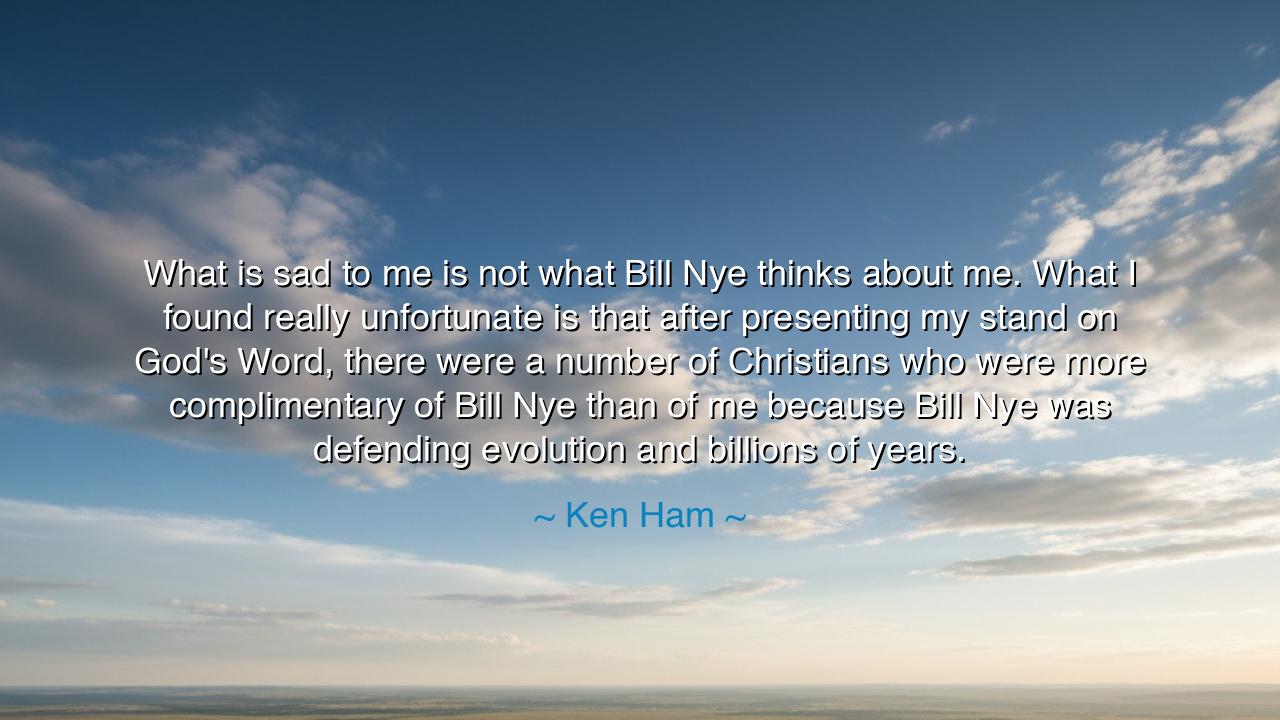
What is sad to me is not what Bill Nye thinks about me. What I
What is sad to me is not what Bill Nye thinks about me. What I found really unfortunate is that after presenting my stand on God's Word, there were a number of Christians who were more complimentary of Bill Nye than of me because Bill Nye was defending evolution and billions of years.






Hear the lament of Ken Ham, who spoke after standing in the arena of ideas, where faith and science clashed before the watching world: “What is sad to me is not what Bill Nye thinks about me. What I found really unfortunate is that after presenting my stand on God’s Word, there were a number of Christians who were more complimentary of Bill Nye than of me because Bill Nye was defending evolution and billions of years.” These words are not merely about a debate, but about the sorrow of division within one’s own house, the grief of finding disagreement among those who share the same name of faith.
From the beginning, the ancients knew the bitterness of such divisions. In the early church, men and women who called themselves Christians quarreled fiercely about the nature of Christ, the meaning of Scripture, the path to salvation. Councils were called, creeds were written, and yet division lingered. Ham’s sorrow echoes this old wound: not that the outsider, the skeptic, the man of science, would oppose him—that is expected. What stings is when those who claim the same God give honor to the opponent rather than to the brother.
Consider the story of Martin Luther, who stood before princes and priests declaring, “Here I stand, I can do no other.” He was not most wounded by the attacks of Rome, but by the betrayal of fellow reformers who turned against him, or by the divisions that fractured his own movement. So too does Ham feel the weight of isolation—not because Bill Nye dismisses his claim, but because those who share his faith seemed to admire the eloquence of the challenger more than the conviction of the believer. This is the sorrow of every prophet: to find less welcome among their own people than among strangers.
And yet, within this pain lies an ancient truth. For faith has always been tested not only by the arguments of those outside, but by the doubts and disagreements within. The Hebrew prophets were often scorned not by foreign kings, but by Israel itself. Jeremiah was cast into a cistern by his own people, though he spoke the words of God. The sadness Ham names is part of this same pattern: that standing on conviction may not bring honor, even from those who share your creed, but may instead bring loneliness and reproach.
The lesson for us is not to take sides in this particular quarrel of evolution and creation, but to see the deeper meaning: that to hold to conviction is to walk a lonely road, and that admiration and agreement, even from allies, cannot be counted on. If you would stand for something, whether faith, truth, or justice, prepare yourself not only for the opposition of enemies, but also for the disappointment of friends. The true test of belief is not when outsiders oppose you, but when your own household does not understand.
Still, there is also a warning in his lament: that admiration for eloquence must not blind us to the weight of conviction, and that disagreements within a community must be handled with care. To exalt the opponent and scorn the brother may wound more deeply than intended, and may fracture the very bonds that hold a people together. The ancients urged charity in disputation, to contend fiercely for truth but to do so with love, lest victory in argument become defeat in fellowship.
Practical action follows: if you hold convictions, hold them with courage, but also with humility. Do not measure your worth by the applause or scorn of others, whether stranger or kin. And if you find yourself listening to a debate, or weighing two voices, honor not only the eloquence of speech but the integrity of the one who speaks. Above all, speak to those with whom you disagree—especially those of your own community—with respect, lest unity be destroyed by careless praise of the outsider over the brother.
Thus Ken Ham’s sorrow, though rooted in a single debate with Bill Nye, becomes a lesson of the ancients: that conviction often brings loneliness, that the deepest wounds are struck not by enemies but by friends, and that the path of faith, or of any great principle, requires endurance. Let us then be wise, honoring truth with courage, but also walking with compassion toward those who share our name, lest we deepen the sorrow of those already burdened with standing alone.






AAdministratorAdministrator
Welcome, honored guests. Please leave a comment, we will respond soon